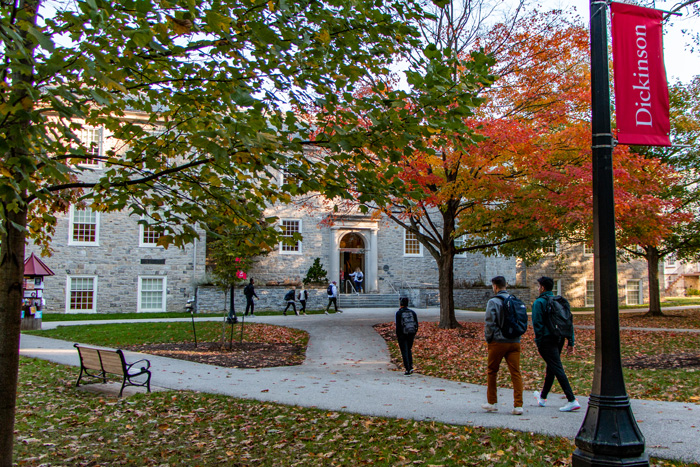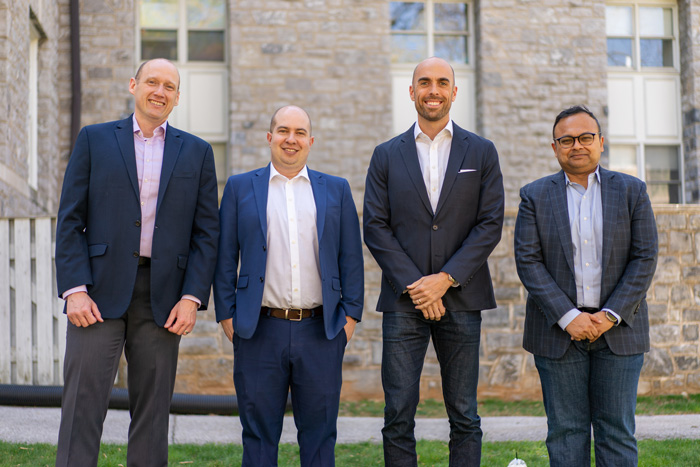International Business & Management Celebrates 25-Year Bull Run

Althouse Hall, home to the Department of International Business & Management. Photo by Joe O'Neill.
Alumni return for three-day celebration to impart words of wisdom and life experiences
by Tony Moore
The 14th-century Greeks were onto something when they deployed (and named) a liberal-arts education. It had it all: philosophy, language, oration, literature and the arts. It provided a broad-based education in every subject that might ground its citizens intellectually, one that sought to edify students in critical thinking, problem-solving, communication skills and a full suite of life skills.
It was all pretty appealing to Benjamin Rush, and he gave the platform a long-term home when he founded Dickinson in 1783. But while the liberal arts are as relevant today as they were 700 years ago, in 1995 the college’s administration decided to investigate the possibility of adding a major in business to the curriculum—something outside the traditional liberal-arts landscape.
All they had to do was snap it into place, like a Lego piece.
True to the Liberal Arts
But that wasn’t the approach, to no one’s surprise. The idea, according to one of the department’s founders, Associate Professor of International Business & Management Michael Fratantuono, was that the new department had to be true to the ethos of the college and had to be built on its existing strengths. It had to exist as a natural part of the landscape, not something forced onto it. Drawing up a plan inspired by the existing international studies major, the team of faculty and administrators submitted it into the pipeline. And, “after heated debate,” the plan was approved by a vote of the faculty, and Fratantuono and Professor of International Business & Management Steve Erfle moved over from economics to steer the new ship.
“There was a desire to address the field of business, but in a way that reflected the liberal arts and Dickinson’s distinctiveness,” says Neil Weissman, provost and dean of the college, who has been at Dickinson since 1975. “Hence the breadth of perspective that the program includes. And of course the decision to focus on the international dimension.”
Upon its foundation, Dengjian Jin—professor of international business & management, current chair of the department and John J. Curley '60 and Ann Conser Curley '63 Faculty Chair in International Studies, Business & Management—was the first person to be hired. The new program was soon called the Department of International Studies, Business & Management, and it was home to both international studies and IB&M majors until it was split into two a few years later.
1997 Launch = Immediate Success
IB&M started to offer courses in the fall of 1997, and the number of students majoring in the discipline per year grew to more than 30 over the next three years. Before long it was 50, and the college authorized additional faculty, allowing the department to broaden and strengthen its curriculum.
“Then, quite suddenly, the flow of students in the IB&M pipeline dramatically increased,” says Fratantuono. “The number of majors that would graduate in 2009 jumped to 83. Neil Weissman let us know that if that type of growth continued, so that IB&M majors represented too large a share of graduating students, then Dickinson’s status as a liberal-arts college would be at risk.”
The department could either limit the maximum number of majors or increase the difficulty of the major to enforce a new standard of selectivity.
“In keeping with economic theory and public relations common sense, we chose the latter,” says Fratantuono, explaining that a department then in its infancy now touches nearly every other discipline, still drawing its key strength from the foundation upon which Benjamin Rush chartered Dickinson. “The IB&M major is a human system that is embedded in yet other systems, and is a subsystem of Dickinson, created to be true to the liberal arts.”
Continued strength
The department's curriculum has evolved over the years, responding to changes in the global business landscape and the demands of the job market. And it’s been incredibly successful in attracting students to the college through such classes as Nonprofit Management; Global Health Care; Business & Climate Change; Business Ethics; Innovation, Entrepreneurship & the New Economy; and Leadership—all geared to prepare the next generation of business leaders for an ever-changing global landscape.
In 2022, the department marked 25 years since it launched, and despite how challenging the curriculum still is, IB&M has always been one of the most popular majors at Dickinson—likely because of its uniqueness, especially in the liberal arts, and the way it prepares students for a wide array of career paths, including in finance, international business, marketing and business development, among myriad others. In fact, in every year since 2009, more Dickinsonians have graduated with an IB&M major than with any other major, making it arguably the most successful department in the history of the college.
“Since its inception, IB&M has been a vital program for Dickinson,” says Jin. “It not only has been one of the largest majors for several years, but it also has generated great synergy with our Center for Sustainability Education, our foreign language departments, our overseas programs, our economics departments and our newly created data analytics major.”
That the department intersects with so many others—and so many global realms—is no surprise to anyone who’s taken such recent courses as Marketing in a Global Context, Consumer Behavior, International Development and Intermediate Financial Accounting Topics Including International Perspectives. And the department’s graduates go on to careers as diverse as the major itself.
Alumni majors Return in Force
For a weekend celebration in April commemorating the 25th anniversary of the department, alumni from a wide array of careers returned to campus. The three-day gathering featured more than a dozen classroom discussions with alums and students and a dinner reception with emeriti, current faculty, department staff and students. And an alumni/student coffee hour kicked off the final day of events, hosted by Women in Econ, the Investment Club, the Marketing Club and IB&M majors. These events featured Jon Carpenter ’98, Ashley Grimm ’04, Jim Paterno ’85, Diane & Steve Skalak ’77, P'07, and Adam Volchko ’13. (On May 17, the festivities continue at a private gathering at the Cornell Club of New York, an event meant to promote networking among Dickinson alumni working in international business.)
Another highlight of the weekend was an alumni career panel, “Strategies for Career Success,” featuring Alex Osberg ’09 (manager, global CPG sales, Twitter), Leo Davelman ’02 (vice president of customer success, iPipeline), Jason Fine ’09 (vice president, account management & strategic partnerships, Meazure Learning) and Rohan Sen ’08 (technology investment banking, Bank of America Merrill Lynch).

Before the IB&M alumni career panel, from left: Leo Davelman ’02, Jason Fine ’09, Alex Osberg ’09 and Rohan Sen ’08. Photo by Dan Loh.
The panel was introduced by current students and was met with a wave of enthusiasm. As it turned out, the enthusiasm was flowing in both directions.
“In 25 years, having worked with a tremendous number of people, having hired a tremendous number of people, I have still never seen a major like this implemented anywhere out there in higher ed,” said Davelman, an early graduate of the IB&M program. “And I haven't seen this caliber of students, this caliber of candidates produced anywhere else for the kinds of things that I find valued in my career. I’m so incredibly excited to be back here, talking to you, and love seeing all of you in the audience.”
Fine remarked that he often talks to prospective students about how his liberal-arts education and IB&M major affected his career trajectory and the person he is today.
“I think one of the biggest things around the liberal-arts education is going beyond the core knowledge that you're learning in your classes and taking a lot of those skills out of the classroom,” he said, noting that while he was a student, he gave somewhere in the neighborhood of 25 presentations across all his classes, on subjects far afield from business. “So I was building public-speaking skills, really learning how to think critically and doing that through the different courses, doing case studies and assignments, working in teams. It helps prepare you and distinguish you from others and your peers.”
Closing Advice
Osberg also hit on the value of the “soft skills” of his liberal-arts education, saying that while he was grounded in the IB&M curriculum, prepared for what might come his way across every facet of it, he was also prepared for the world outside of that realm.
“Certainly throughout my entire career, change has been constant—that’s the only constant!” he said, adding that it’s important to know what you’re interested in, but maybe more important to know what you’re not interested in. “So you have to be ready to go. And this education set me up well for that. One of the benefits of a Dickinson liberal-arts education is that it allowed me to be less so a mile deep and an inch wide, and maybe a mile wide and half a mile deep. So I was really that much more flexible.”
Sen, who works in areas such as M&A and IPOs for Bank of America, had some words of wisdom for students, advising them to key in on three things to succeed in career and life: Work hard (“There is no substitute”), network (“Don't forget to network just because you have a job”) and carve out time for people who are important to you (“Make sure you have a life”).
“At the end of the day, you have to figure out what's really good for you,” he said in closing. “Because no one, I can assure you, no one—not us here, your professors, your parents—no one can tell you what you will be good at. Because that's the only thing you can assess. Don't ignore people's viewpoint or opinion. Take them into consideration. But you have to make your own decisions on what you want to do and stick with it.”
Sounds like advice the founders of the IB&M department might have taken 25 years ago. And they’ve definitely stuck with it.
TAKE THE NEXT STEPS
Published May 2, 2023